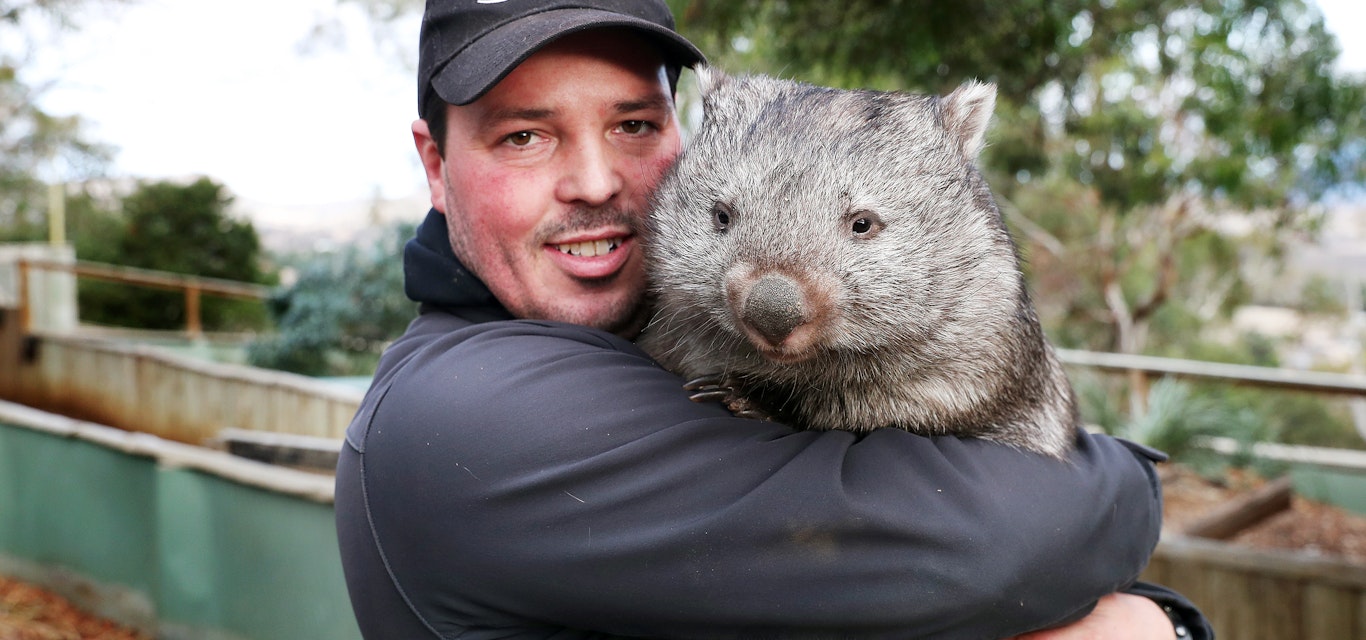A mile in the shoes of a wildlife sanctuary owner
As the owner of Bonorong Wildlife Sanctuary, Greg Iron’s days (and sometimes nights) are filled with caring for animals. Even his honeymoon featured a dramatic animal rescue. He chats with Sarah Aitken.
After a delayed wedding thanks to Covid, Greg and his wife Mel were finally taking some time off from rehabilitating animals and raking up poo at Bonorong, the native animal sanctuary they run together near Hobart. They drove off around Tasmania with their little caravan to enjoy a couples-only break.
“I think it was on day two, I turn around and see Mel’s off swimming in freezing cold water down at Port Arthur plucking an injured penguin out of the water!” laughs Greg. “With me cheering from the shore, because I swim like a rock – there would’ve been two things being rescued if I’d gone in.”
That was a typical holiday for the Irons, who tend to take small trips close to home and stay within phone coverage for any emergency calls from the sanctuary.
“Every time we go away, I guarantee you, we will either find an animal on the way or have one be injured right in that area the second we get there. It’s just Murphy’s Law I think,” says Greg.
Running the sanctuary and rescue service is more than a full-time job. Mel and Greg live on site with their baby, Lara, and it’s not unusual for one of them to be up at night with either the baby or an injured animal, or both. They wouldn’t have it any other way.
It’s a 24/7 job running the sanctuary , says Greg. “A lot of people think that’s not really sustainable but, you know, when it’s your passion – and thankfully it’s Mel’s as well – you’re happy to live and breathe it.”
Credit: Chris Kidd
Credit: Chris Kidd
Greg has been living and breathing it his whole life. At the age of seven, young Greg went to a birthday party at Bonorong and was hooked, telling his mum, “I’m going to own this place one day!”
By the age of 25 he was the owner. “The way I describe it is that musicians know they want to do music and artists know they want to do art. It was the same really, it was just always animals for me.
“I’ve never been able to put my finger on what it was about animals that just captured my imagination and fascinated me, but at those book fairs in primary school everyone would come home with a fiction book, and I’d come back with an animal encyclopaedia. I was always revolving around animals somehow.”
Growing up in suburban Sandy Bay, Greg would bring home all sorts of creatures needing help, creating makeshift enclosures in the backyard. As he grew, so did his passion, though his skills were self-taught and he struggled to find a university course that focused on native animals.
He became known as the guy to call if you found an injured animal anywhere in greater Hobart.
“People would bring them to me and there was just no one to call for help. I’d be doing all the wrong things, everything that I now advise people not to do, because there was just no one to guide me. And I guess that’s where my passion for wanting to start a rescue service began: the fact that that felt really unacceptable to me.”
Credit: The Precinct Studios
Greg had been working for Bonorong for about five years when his parents agreed to let him use the flat beneath the house to run the first rescue service in Tasmania. Then the opportunity to lease, then buy, Bonorong came up and Greg jumped at it.
He transformed it from a wildlife collection to an active and evolving rescue and rehabilitation centre with a sanctuary for those animals that can’t be released. The team has developed training courses to teach carers the things Greg wished he’d been taught in his early days.
There’s a veterinary hospital with a large window so visitors can view surgeries. They’ve gone from having six staff to 77 and have recently funded a raptor rescue service in the north of the state. As a social enterprise, the work is funded by people coming through the gates and by donations.
“We could have been done and dusted within six months if people hadn’t supported it,” says Greg. “But you know, what we’ve found is a huge community of people who really care. We’ve discovered very quickly that, you know, people do support good things.”
Last year 17,000 animals needed assistance through Bonorong. “It’s a number that’s growing, sadly,” says Greg. “If those numbers keep going up, we’re gonna have to really keep growing. Or start robbing banks. One of the two. Maybe both.”
Visit the Bonorong website for more information. For any injured or orphaned wildlife, call the Bonorong Rescue Service on 0447 264 625 any time of the day or night.
